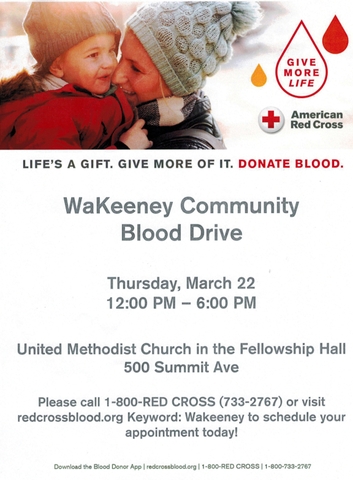Contact Seller
Blood Drive- Please Give 22 March 2018
Description
WaKeeney Community Blood Drive
Thursday, March 22, 2018
12 - 6 PM
United Methodist Church, 500 Summit Ave, WaKeeney, Ks 67672
Call 1-800-RED CROSS (733-2767) or visit redcrossblood.org
Why does it seem like there is always a blood shortage?
Medical advances have improved the treatment of serious illness and injuries. These advances have increased the need for blood and blood products. With only 38% of the U.S. population believed to be eligible to give blood, and the growing number of aging “baby boomers” the need for blood remains and healthy donors are constantly needed.
Blood Basics
Our blood is a living tissue with a variety of critical functions: It delivers oxygen and nutrients to our organs, fights infections and creates blood clots, preventing us from bleeding excessively when a blood vessel is damaged. The liquid part of our blood, called plasma, is key for maintaining blood pressure and supplying critical proteins for blood clotting, immunity and maintaining the correct pH balance in our body -- critical to cell function. Plasma also carries the solid part of our blood -- white blood cells, which work to destroy viruses and bacteria; red blood cells, which carry oxygen through the body; and platelets, which help clotting.
Eating properly before and after your blood donation will ensure that you have enough hemoglobin to donate and you can prevent excessive fatigue after your good deed. Here’s what to eat (and what to avoid) to beat fatigue after a blood donation.
1. DO eat lean, iron-rich foods.
This one’s a no-brainer. Leading up to your blood donation appointment, enjoy fish (especially oysters), poultry, beans, lentils, tofu, potatoes, cashews, spinach, raisins, and iron-fortified cereals and breads.
2. DON’T eat fatty foods.
After donating, your blood will be tested for infectious diseases like hepatitis C and HIV. Too much fat in the bloodstream can affect the screening. If they are unable to get an accurate reading of your blood, your donation will be discarded. (Yep, that means losing a pint of blood for nada.) Skip burgers, ice cream, fries, and other greasy foods to keep excess fat out of your bloodstream.
3. DO add vitamin C to your meals.
Vitamin C increases your body’s ability to absorb iron. In general, your body does not soak up each ounce of iron available in an oyster or chicken wing; only a fraction is actually absorbed. Combining iron-rich foods with other ingredients high in vitamin C will increase the amount your body can absorb. Tomatoes, papaya, citrus, broccoli, and spinach are all great sources.
4. DON’T drink alcohol before or after.
For 24 hours before and after your blood donation, skip your evening glass of red wine.
5. DO drink more water.
The American Red Cross recommends getting an extra 16 ounces of water in the day before and after your donation. (That means 16 ounces more than what you would typically drink for proper hydration.
6. DON’T take aspirin 48 hours before if you’re donating platelets.
Platelets aid in forming clots to stop bleeding when you’re cut or wounded. These little cells have to be used within five days of donation, so they are in constant demand. Aspirin affects the function of the platelets, so you will not be able to donate with aspirin in the bloodstream. (Ibuprofen is just fine.)
7. DO have a healthy snack after donating.
Many blood donation drives will provide snacks, but it’s a good idea to bring your own just in case (especially if you have food allergies or other dietary restrictions). Come prepared with something light and abundant in iron to help you restock your hemoglobins. Trail mix or bars made of nuts and dried fruit (like KIND or Larabars) are great options since both cashews and raisins are good sources of iron.
Beyond what goes in your belly, the other important self-care tip is to rest. Get a good night’s sleep before donating, relax and take it easy as you’re getting the blood drawn, and avoid heavy lifting or intense exercise for at least 24 hours afterwards.

